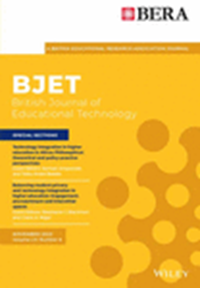Contributions of self-efficacy, L2 grit and digital literacy to informal digital learning of English: A structural equation modelling approach
Abstract
Despite the proliferation of studies on computer-assisted language learning, scant research attention has been paid to informal digital learning of English (IDLE) and its antecedents. Therefore, the current study aimed to investigate whether Iranian EFL learners' L2 grit, digital literacy and self-efficacy contributed to their IDLE. A total of 313 EFL learners (96 males, 217 females), selected through snowball sampling, completed an electronic survey. Structural equation modelling (SEM) was employed to analyse the relationships between the main variables. The results of SEM analysis revealed that EFL learners' digital literacy, L2 grit and self-efficacy significantly influenced their engagement with IDLE activities. In addition, the findings revealed that digital literacy was the strongest predictor of EFL learners' IDLE. These findings highlight the significance of digital literacy skills coupled with positive personality-based and cognitive variables in forming learners' tendency to learning English in informal digital settings. The study implied that positive characteristics could enhance cognitive and psychological resources, leading to positive outcomes (ie, IDLE). Finally, implications were offered.
Practitioner notes
What is already known about this topic
- Gritty language learners with high self-efficacy are more likely to master language skills inside and outside the classroom.
- Digital literacy can increase learners' tendency to learn English through digital platforms.
What this paper adds
- Digitally literate EFL learners with high levels of grit and self-efficacy practise IDLE activities.
- Digital literacy plays a more important role in IDLE compared to personality-related and cognitive factors.
Implications for practice
- EFL teachers are recommended to model using digital platforms for language learning in out-of-class digital settings.
- EFL teachers can increase EFL learners' grit and self-efficacy through interventions to enhance their engagement in IDLE-embedded activities.




 求助内容:
求助内容: 应助结果提醒方式:
应助结果提醒方式:


